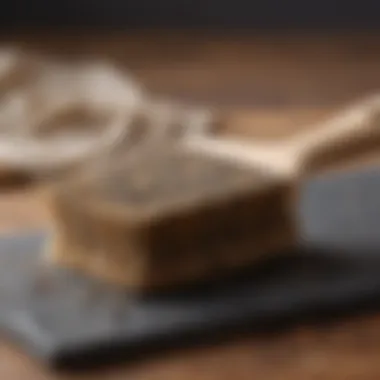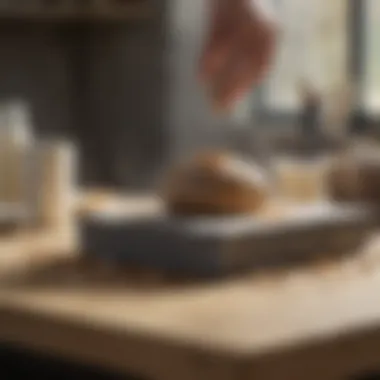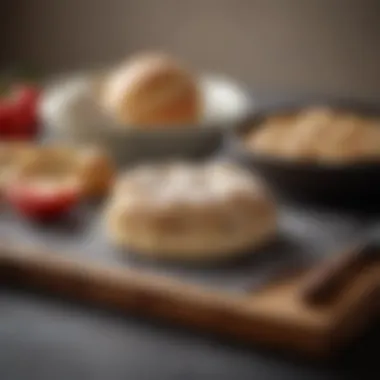Expert Tips for Properly Cleaning Your Baking Stone for Longevity and Quality


Cleaning Your Baking Stone
Upon embarking on your culinary enterprise, it is paramount to nurture and preserve the tools of your craft. A baking stone, a true workhorse in the realm of baking, requires meticulous care to ensure its longevity and functionality. In this detailed guide, we delve into the art of cleaning a baking stone, imparting essential wisdom to maintain its pristine condition for delectable culinary creations.
Understanding the Importance of Proper Cleaning:
A baking stone, also known as a pizza stone, is a porous, heat-retaining slab that distributes heat evenly for crispy crusts and delightful textures. Over time, residue from oils, flour, and food particles can accumulate on its surface, affecting its performance and altering the taste of your baked goods. By adopting a diligent cleaning routine, you not only safeguard the integrity of your baking stone but also elevate the quality of your culinary endeavors.
Step-by-Step Cleaning Guide:
- Cooling Phase: After your baking stone has facilitated the creation of delectable confections, allow it to cool completely before proceeding with cleaning. Abrupt temperature changes can shock the stone, leading to cracks or breakage.
- Gentle Brushing: Using a soft-bristled brush or a damp cloth, gently remove any food remnants or debris from the surface of the baking stone. Avoid using soap or harsh chemicals, as these can permeate the porous stone and compromise its flavor-enhancing properties.
- Moistening the Stone: For stubborn stains or lingering residue, lightly dampen the surface of the baking stone with water. This gentle hydration helps to loosen particles without damaging the stone's composition.
- Natural Debris Removal: In cases where stubborn residues persist, consider employing natural cleaning agents such as baking soda or white vinegar. These gentle yet effective solutions aid in dislodging tough stains without imparting harsh chemicals to your culinary creations.
- Thorough Drying: Once the cleaning process is complete, ensure that the baking stone is thoroughly dried before storage or reuse. Lingering moisture can lead to mold growth and detract from the stone's performance.
Maintenance and Longevity:
By adhering to these careful cleaning practices, you are not only preserving the integrity of your baking stone but also fostering a culinary environment conducive to remarkable flavors and textures. Embrace the art of cleaning as a holistic approach to your culinary journey, where every detail contributes to the harmonious symphony of flavors that grace your table.
Introduction
Cleaning a baking stone is an essential chore for anyone passionate about baking, especially those who fancy creating delectable pizzas. This practice not only enhances the stone's longevity but also ensures your culinary creations maintain the utmost quality. By delving into the intricacies of maintaining a baking stone, you equip yourself with the knowledge needed to achieve perfect results every time you bake. Whether you're a seasoned chef or an amateur cook, understanding the nuances of cleaning a baking stone is crucial. This comprehensive guide will walk you through the entire process, covering everything from the composition of baking stones to the importance of meticulous cleaning techniques. Grab your apron, roll up your sleeves, and let's embark on this culinary journey to cleaner, more efficient baking practices!
Understanding Baking Stones
In delving into the realm of baking stones, there lies a fundamental appreciation for the crucial role they play in the culinary world. Understanding the intricacies and nuances of baking stones is paramount for aspiring chefs and seasoned cooks alike. A baking stone, typically crafted from materials like cordierite, ceramic, or steel, serves as a versatile tool in achieving optimal heat distribution for baking various delicacies. The composition of baking stones determines their durability, thermal conductivity, and overall performance in the cooking process. It is imperative to grasp the significance of selecting the right baking stone to enhance baking results and elevate culinary experiences.


Composition of Baking Stones
The composition of baking stones is a pivotal aspect that influences their functionality and effectiveness in the kitchen. Baking stones are commonly made from materials such as porous cordierite, durable ceramic, or robust steel. Cordierite baking stones are renowned for their heat retention properties, ensuring even baking and crispy crusts. Ceramic baking stones offer excellent thermal shock resistance, ideal for high-temperature baking. Steel baking stones provide rapid heat transfer, perfect for crisp pizza bases and artisan bread. Understanding the unique characteristics of each baking stone material empowers chefs to make informed decisions when selecting the most suitable option for their culinary needs.
Importance of Cleaning
The importance of cleaning baking stones cannot be overstated in maintaining their longevity and preserving their cooking performance. Residual food particles, grease, and debris accumulated on baking stones can alter the flavor of baked goods and hinder heat distribution. Regular cleaning prevents the buildup of unwanted residue, ensuring that each baking session yields impeccable results. By adhering to proper cleaning techniques and practices, chefs can prolong the lifespan of their baking stones and sustain their optimal baking capabilities. Understanding the critical role of cleaning in the care and maintenance of baking stones is key to upholding culinary standards and achieving consistent baking excellence.
Materials Required for Cleaning
When it comes to cleaning your baking stone, having the right materials is crucial. The choice of cleaning supplies can impact the effectiveness of the cleaning process and the longevity of your baking stone. One of the key materials needed is a scraper or a spatula designed for baking stones. These tools help in removing burnt residues and stubborn debris without scratching or damaging the stone's surface. Additionally, you will require mild dish soap, warm water, a soft-bristled brush, and clean towels to ensure thorough cleaning and drying of the stone.
Another essential material for cleaning your baking stone is baking soda. Baking soda acts as a gentle abrasive that helps in lifting tough stains and residues from the stone surface without causing any harm. It is a natural and safe cleaning agent that effectively removes grease and grime buildup without leaving behind any harmful residues that could affect the taste of your baked goods. Vinegar is also a useful ingredient for cleaning baking stones due to its acidic properties, which aid in cutting through grease and disinfecting the surface.
When selecting materials for cleaning your baking stone, it is important to avoid harsh chemicals or abrasive cleaners that can damage the stone. Always opt for gentle cleaning agents and tools to preserve the integrity and quality of your baking stone. By using the recommended materials for cleaning, you can ensure that your baking stone remains in pristine condition, ready to deliver delicious and evenly baked results every time.
Pre-Cleaning Preparation
In the realm of maintaining a baking stone's longevity, the pre-cleaning preparation stage plays a crucial role. Before delving into the cleaning process, it is essential to undertake this preparatory step to ensure optimal results. One key aspect of pre-cleaning preparation is allowing the baking stone to cool down completely. By doing so, you prevent the risk of thermal shock, which can occur when a hot stone comes into contact with cool substances. This practice not only safeguards the integrity of the stone but also enhances its durability over time. Another vital element to consider during pre-cleaning preparation is the removal of excess debris. Prior to cleaning, it is advisable to scrape off any food remnants or burnt particles stuck on the surface. This step not only streamlines the cleaning process but also prevents these residues from hardening further, making them more challenging to remove later on. By prioritizing pre-cleaning preparation, you set the foundation for a more effective and efficient cleaning experience, ultimately preserving the quality and performance of your baking stone.
Cooling Down the Baking Stone
When it comes to cleaning a baking stone, cooling it down before initiating the cleaning process is paramount. Allowing the stone to cool gradually post-use is imperative to avoid any sudden temperature fluctuations that may lead to cracking or damage. This step is essential in maintaining the structural integrity of the baking stone, ensuring its longevity. By patiently allowing the baking stone to cool down on its own, you mitigate the risk of thermal stress and uphold the quality of the stone for future use.
Removing Excess Debris


The task of removing excess debris from your baking stone is not to be overlooked. Before embarking on the cleaning process, take the time to carefully scrape off any leftover food bits or residue clinging to the surface. This step is vital as it prevents these remnants from hardening onto the stone, making them significantly harder to eliminate later on. By diligently removing excess debris, you pave the way for a more effective cleaning process, ultimately maintaining the pristine condition of your baking stone and ensuring its continued performance in all your culinary pursuits.
Cleaning Methods
In the realm of baking stones, cleaning methods hold paramount significance. The longevity and functionality of your baking stone hinge on the meticulous cleaning practices you employ. By delving into the various cleaning methods outlined in this article, you equip yourself with the knowledge and tools necessary to keep your baking stone in pristine condition, ensuring that each culinary endeavor is met with success. Understanding the importance of proper cleaning techniques sets the stage for maintaining the quality and effectiveness of your baking stone over time.
Using Water and Scraper
When it comes to cleaning your baking stone, utilizing a combination of water and a scraper emerges as a fundamental yet effective method. The natural abrasive properties of water coupled with the scraping action of a suitable tool work in harmony to remove stubborn residue and food particles from the surface of the stone. Before embarking on this cleaning journey, ensure that the baking stone has cooled down completely to prevent any thermal shocks that may compromise its integrity. By employing this method regularly, you pave the way for consistent performance and longevity of your baking stone.
Baking Soda Paste Application
Another method that stands out in the realm of baking stone cleaning is the application of a baking soda paste. This simple yet powerful concoction harnesses the abrasive nature of baking soda to tackle tough, baked-on stains effectively. By combining baking soda with a small amount of water to form a paste, you create a gentle yet potent cleaning agent that can work wonders on your baking stone. Apply the paste, allow it to sit for a designated period to break down dirt and grime, then scrub gently to reveal a refreshed and revitalized surface. Incorporating this method into your cleaning routine adds a layer of thoroughness and care that contributes to the longevity of your baking stone.
Vinegar Solution
In the realm of natural cleaning solutions, vinegar stands as a versatile ally, especially when it comes to cleaning baking stones. The mild acidity of vinegar makes it a potent cleaner, adept at dissolving tough residue and grease that may have accumulated on your baking stone over time. By creating a vinegar solution and utilizing it as a cleaning agent, you not only sanitize the surface of the stone but also eliminate odors and bacteria, ensuring a hygienic environment for your culinary creations. This method adds a touch of eco-friendliness to your cleaning routine, aligning with sustainable practices while maintaining the integrity of your baking stone.
Deep Cleaning Techniques
When it comes to maintaining the quality and longevity of your baking stone, deep cleaning techniques play a vital role. Unlike regular cleaning methods, deep cleaning ensures the removal of stubborn residues and ensures optimal performance during baking sessions. By delving deep into the crevices of the stone, you eliminate any built-up grease, carbonized food particles, and lingering odors that could affect the taste of your culinary creations. This section will explore the significance of deep cleaning techniques and highlight specific methods to rejuvenate your baking stone.
Heat Treatment Method
Among the various deep cleaning techniques, the heat treatment method stands out as an effective way to eliminate tough stains and residue from your baking stone. By subjecting the stone to high temperatures, you can burn off accumulated food remnants, grease spots, and bacteria, leaving your stone clean and ready for future use. This method not only sanitizes the stone but also helps to prevent any potential cross-contamination during baking. It is essential to follow safety precautions and manufacturer recommendations to avoid damaging the stone while using this technique.


Water Soaking
Another deep cleaning technique that proves to be beneficial for baking stones is water soaking. By allowing the stone to soak in warm water for an extended period, you can loosen dried-on residues and make them easier to remove. This method is particularly useful for tackling tough spots that do not respond to regular scrubbing. Water soaking also helps to rehydrate the stone, preventing it from drying out and becoming brittle over time. However, it is crucial to avoid using soap or harsh chemicals during this process to prevent any unwanted flavors from seeping into the stone.
Drying and Storage Tips
In the realm of baking stones, understanding the significance of proper drying and storage techniques is paramount. After meticulously cleaning your baking stone, ensuring thorough drying and safe storage is essential to maintain its quality and longevity. Proper drying techniques not only prevent the development of mold and odors but also help in preventing any potential cracking or damage to the stone.
To commence the drying process, gently pat the baking stone with a clean and dry cloth to absorb any residual moisture. Avoid stacking wet or damp baking stones together, as this can trap moisture and lead to undesirable consequences. Instead, allow the baking stone to air dry completely in a well-ventilated area before proceeding with the storage phase.
When it comes to storage, selecting an appropriate location is key to preserving the integrity of the baking stone. Opt for a cool and dry environment away from direct sunlight or heat sources. Storing the baking stone in a well-ventilated cabinet or pantry can shield it from dust and debris while maintaining its freshness for future use.
Consider utilizing a protective cover or wrapping the baking stone in a clean cloth before placing it in storage. This extra layer of protection helps safeguard the stone from accidental scratches or impacts that could compromise its surface. Additionally, storing the baking stone on a flat, stable surface minimizes the risk of it shifting or tipping over in storage.
By following these meticulous drying and storage tips diligently, you can ensure that your baking stone remains in top condition, ready to elevate your culinary creations whenever inspiration strikes. Embracing these practices not only safeguards your investment in high-quality bakeware but also enhances the overall cooking experience, making each recipe a delightful adventure in flavor and texture.
Maintenance and Longevity
To ensure that your baking stone lasts for years to come and continues to enhance your baking endeavors, prioritizing maintenance and longevity is key. By incorporating a regular cleaning schedule and adopting proper care routines, you can significantly extend the lifespan of your baking stone while maintaining its efficacy in conducting heat evenly and producing crispy crusts. The longevity of your baking stone is directly influenced by how well you care for it, making it imperative to establish a consistent maintenance routine.
When it comes to the regular cleaning schedule of your baking stone, consistency is vital. By cleaning your stone after each use, you prevent the build-up of food residues, ensuring that it remains in top condition for future use. Set a routine based on your baking frequency - for frequent bakers, a weekly cleaning might be necessary, while occasional bakers can opt for bi-weekly or monthly cleaning sessions. Remember, the more often you clean your baking stone, the easier it is to maintain and the longer it lasts.
Avoiding harsh cleaners is paramount in preserving the integrity of your baking stone. Abrasive chemicals or cleaners can damage the porous surface of the stone, affecting its ability to distribute heat evenly and absorb moisture during baking. Opt for mild, natural cleaning agents such as baking soda, vinegar, or gentle dish soap. These cleaners effectively remove residue without harming the stone. Additionally, refrain from using metal brushes or tools that can scratch the surface. By embracing gentle cleaning practices, you safeguard the longevity and quality of your cherished baking stone.
Conclusion
Delving into our journey, we unravel a tapestry of reasons why the conclusion is not just a formality, but a crucial milestone in your path to gastronomic delight. The benefits of adhering to a rigorous cleaning schedule for your baking stone extend far beyond mere aesthetics. Enhanced heat retention, even baking distribution, and the prevention of off-flavors seeping into your delectable treats all stand as pillars supporting the imperative of this seemingly modest chore.
Furthermore, considerations about the conclusion entail a deeper reflection on the philosophy of cooking itself. Every scratch or stain on your baking stone narrates a tale of culinary conquests and intimate moments shared over scrumptious meals. Embracing the conclusion not only preserves the integrity of this humble slab of stone but also honors the memories and flavors that have danced upon its surface.
As we bid farewell to our discourse on the cleaning of baking stones, let us carry forth a newfound reverence for these unassuming yet indispensable kitchen assets. In the symphony of flavors and textures that define our culinary adventures, the baking stone stands as a steadfast companion, awaiting our diligent care and attention. Through the simple act of cleaning, we uphold a tradition that transcends generations, ensuring that each bake emanates with the love and dedication poured into its foundation.







